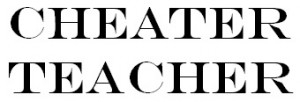 The New York Times has published an op-ed column titled “How I helped teachers cheat.” It was written by Dave Tomar, a self-professed “academic ghostwriter,” whose job was to work for an online custom paper mill. Students would contact the website with an assignment, and they would receive a response with a price to complete the paper. Mr. Tomar was one of the “ghostwriters” who wrote the papers.
The New York Times has published an op-ed column titled “How I helped teachers cheat.” It was written by Dave Tomar, a self-professed “academic ghostwriter,” whose job was to work for an online custom paper mill. Students would contact the website with an assignment, and they would receive a response with a price to complete the paper. Mr. Tomar was one of the “ghostwriters” who wrote the papers.
This was not my first knowledge of the author. Three years ago he wrote an essay in The Chronicle of Higher Education, where he talked about his work. First published under a pseudonym, the essay generated an immense amount of discussion (the online version has 640 posted comments). A little less than a year later, the author voluntarily outed himself in the Chronicle in advance of a book he had written on his exploits under his (presumably) real name.
 The Chicago Teachers Union (CTU) voted Tuesday to end its seven-day-old strike, and the teachers were back in the schools yesterday. The strike, at the nation’s third largest school district, received quite a bit of attention across the nation, with coverage on major media outlets. There were a number of contentious issues in the negotiations between the CTU and the Chicago Board of Education, but none was more vigorously contested than that of teacher evaluations.
The Chicago Teachers Union (CTU) voted Tuesday to end its seven-day-old strike, and the teachers were back in the schools yesterday. The strike, at the nation’s third largest school district, received quite a bit of attention across the nation, with coverage on major media outlets. There were a number of contentious issues in the negotiations between the CTU and the Chicago Board of Education, but none was more vigorously contested than that of teacher evaluations.